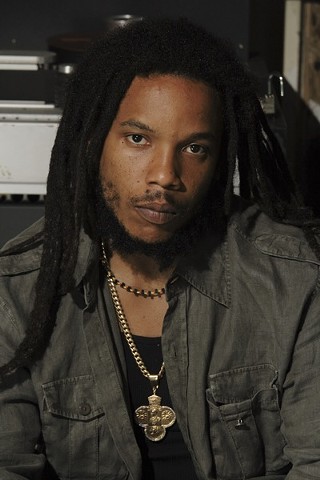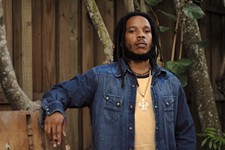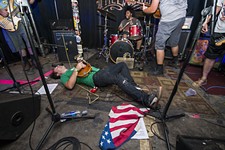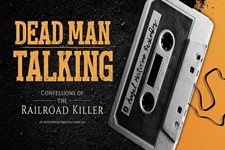Stephen Marley Q&A
Reggae scion on hip-hop, Bob, and a new branch on the family tree
By Chase Hoffberger, 11:00AM, Fri. May 23, 2014
Stephen Marley was born reggae royalty, but that’s not necessarily on your mind when he’s on the other end of a phone call, talking about his upcoming third LP, Revelation Part II: The Fruit of Life, a star-studded marriage of hip-hop and reggae. First time he mentions “my father,” however – the Bob Marley – that’s when you clear your throat.
Now 42, the longtime guitarist in brother Ziggy’s Melody Makers is doing something his father never accomplished: touring America with musical support from his son. Jo Mersa, 23, joins his father Stephen at the Mohawk Friday.
Austin Chronicle: The new album features work from Black Thought, Dead Prez, Rick Ross, and many other rappers. Yet it’s not entirely focused on reggae influencing hip-hop. What else gets explored?
SM: I have a doo-wop song. You know Nina Simone? I have her sampled as well. There are all kinds of vibes.
AC: Which Nina Simone song?
SM: You have to get the album!
AC: Oh, come on, Stephen.
SM: It’s “Keeper of the Flame.”
AC: How do reggae and doo-wop coalesce?
SM: In the Sixties, in my father’s era, Jamaicans used to listen to a lot of American radio. That’s where the three-part harmonies came, from people like the Impressions and Temptations. That style running through Motown has always been a big influence on Jamaica, because of the radio.
It’s music that’s been influenced, like hip-hop, and also music that influenced reggae, like doo-wop. I have a song on the album with Shaggy that samples the Impressions. It shows how that music influenced us on the island.
AC: You’ve always demonstrated an interest in hip-hop. What about hip-hop and reggae makes the marriage work so well together?
SM: Hip-hop music derives from reggae and Jamaica, with Kool Herc having started it all. He was Jamaican and that relationship is embedded. It’s the topics we speak of: street music. Both are styles of street music.
AC: How did the rappers you worked with respond to the invitation of blending the two styles? Were they excited?
SM: Yeah man, of course. We don’t do anything unless it’s organic. One thing that helped is my father and the respect that the music community has for my father, not just for reggae music but because he was a voice of the people. That respect transcends to all his kids and the way that they see us. It’s a continuation of that legacy. We’re not just musicians. We’re of a cause, a great cause.
AC: Your brother Damian doesn’t have as extensive a history crossing over into hip-hop, but he’s found the most success. When he was making Welcome to Jamrock, were you working with him?
SM: Of course. Remember, I did Chant Down Babylon in 1999. That album was a remix of my father with prominent artists in the hip-hop genre. From then, we’ve been catering the production side to incorporate hip-hop music into our music. Going into Nas’ album with my brother, we were already groomed from doing our father’s record.
AC: You’re touring with your son right now, and produced his new EP. You’ve spoken so much of your legacy. What’s it like to see him grow as an artist?
SM: It’s a beautiful thing to be able to be here for him physically. Because of losing our father’s physical presence as a young age, seeing our kids come into maturity is a beautiful thing. We’re grateful to be here and to help the third generation along the way. He can call me and say, ‘Dad, this and that,’ and I’ll give him advice. I never had that privilege.
AC: What are his talents?
SM: He’s 23, so he just left school not too long ago. I never really pushed him or told him to do music. I’ve hardly complimented him until he reached the age where he knew what he really wanted to do. I left him to search and find his own way. Once he said this was it, then I chimed in and started working with him.
AC: What’s impressed you most in that growth?
SM: His determination. He has his own style. He’s very reminiscent of Damian, which, again, I was kind of a mentor for Damian growing up. He has his own style and is true to the music and the cause. That’s the greatest thing for me. Not because you’re the grandson of Bob, but because you’re true to the cause.
A note to readers: Bold and uncensored, The Austin Chronicle has been Austin’s independent news source for over 40 years, expressing the community’s political and environmental concerns and supporting its active cultural scene. Now more than ever, we need your support to continue supplying Austin with independent, free press. If real news is important to you, please consider making a donation of $5, $10 or whatever you can afford, to help keep our journalism on stands.
Kahron Spearman, July 22, 2016
Nov. 16, 2018
Stephen Marley, Bob Marley, Ziggy Marley & the Melody Makers, Jo Mersa Marley, Damien Marley, Nina Simone, Nas, Rick Ross, Black Thought, Dead Prez, Kool Herc, Shaggy, Motown, Temptations, Curtis Mayfield & the Impressions










